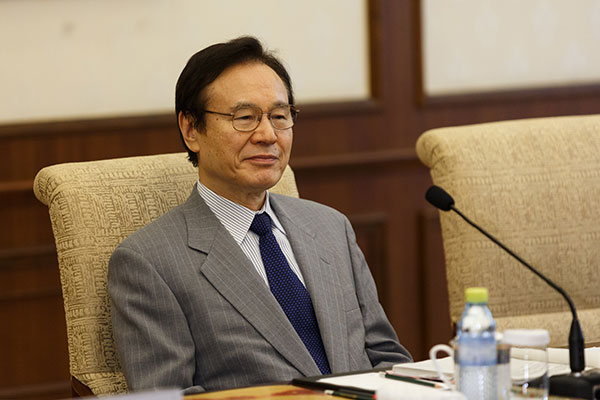

Beijing protests during top-level talks as plan to expand role of forces clears latest hurdle

Shotaro Yachi, head of Japan's National Security Council. CHINA DAILY
Beijing made a strong protest about Tokyo's legislative campaign to lift restrictions on Japan's armed forces, describing them as "unprecedented", during a meeting on Thursday.
State Councilor Yang Jiechi made the representations in Beijing while co-hosting the First China-Japan High-Level Political Dialogue with Shotaro Yachi, the head of Japan's National Security Council and a key adviser to Prime Minister Shinzo Abe.
Japan's ruling coalition pushed its contentious package of security bills through the lower house of the Diet, the country's legislature, earlier in the day despite a boycott of the vote by most opposition members.
Yang noted that this year marks the 70th anniversary of victory in both the War of Resistance against Japanese Aggression and the world's anti-fascist war.
At such a moment, Japan should "respect the major security concerns of Asian neighbors and refrain from doing things that do not facilitate regional peace and stability", Yang said.
He said Japan's proposed adjustments to its military and security policies are "not in accordance with the trend of the current era". Japan is inviting questions over whether it plans to break away from the policy of focusing on self-defense, Yang said.
The Seoul-based Yonhap news agency warned that the bills "would allow the conservative Shinzo Abe administration to reinterpret the Constitution and expand the country's military role abroad".
Lyu Yaodong, an expert on Japan's foreign policies at the Chinese Academy of Social Sciences, said the bills will have a "tremendous impact" as they will make Japan "the biggest variable in the Asia-Pacific region".
Lyu warned that "Japan's military expansion is inevitable", though it claims it simply wishes to protect its allies.
Yang and Yachi held a first meeting in November, a time when relations between the countries were at a low point. After that meeting, the two governments released a landmark four-point consensus intended to improve the strained ties between them.
A statement released after Thursday's meeting said both sides agreed that initiating the dialogue is "a major measure for both countries to enhance high-level strategic communication", and will help to achieve consensus and manage and control differences.
"It is hoped that the two sides will maintain political dialogue and the momentum of the improving Japan-China relationship," Yachi said.
Yachi is on a three-day visit to China, and leading Japanese media such as the San-kei Shimbum newspaper speculated that he will discuss a possible visit to China by the Japanese prime minister later this year.
Ruan Zongze, vice-president of the China Institute of International Studies, said that as the relationship thawed, the dialogue "will help to nurture the positive momentum of the improving ties" as a part of joint official efforts.
The dialogue will also "help contain the actions of Japanese right-wingers" at a time when the country's Cabinet is creating uncertainty over its position regarding the history issue, Ruan said.
 Yunnan-Myanmar Road: The past and present
Yunnan-Myanmar Road: The past and present Campus belle of Xiamen University gets popular online
Campus belle of Xiamen University gets popular online Who says moms cannot be trendy and hot?
Who says moms cannot be trendy and hot? 10 Chinese female stars with most beautiful faces
10 Chinese female stars with most beautiful faces Stunning photos of China's fighter planes
Stunning photos of China's fighter planes Enteromorpha hits Qingdao coast
Enteromorpha hits Qingdao coast Eight fruits that defend men's health
Eight fruits that defend men's health  First batch of female combat pilots with duel degrees fly Flying Leopard
First batch of female combat pilots with duel degrees fly Flying Leopard Top 10 secrets of longevity
Top 10 secrets of longevity Distant district set to shine
Distant district set to shine The break fast club: Observing Ramadan in Xinjiang
The break fast club: Observing Ramadan in Xinjiang GDP figures offer credible economic reassurance
GDP figures offer credible economic reassurance Student LGBT groups struggle for approval from China’s university authorities
Student LGBT groups struggle for approval from China’s university authoritiesDay|Week